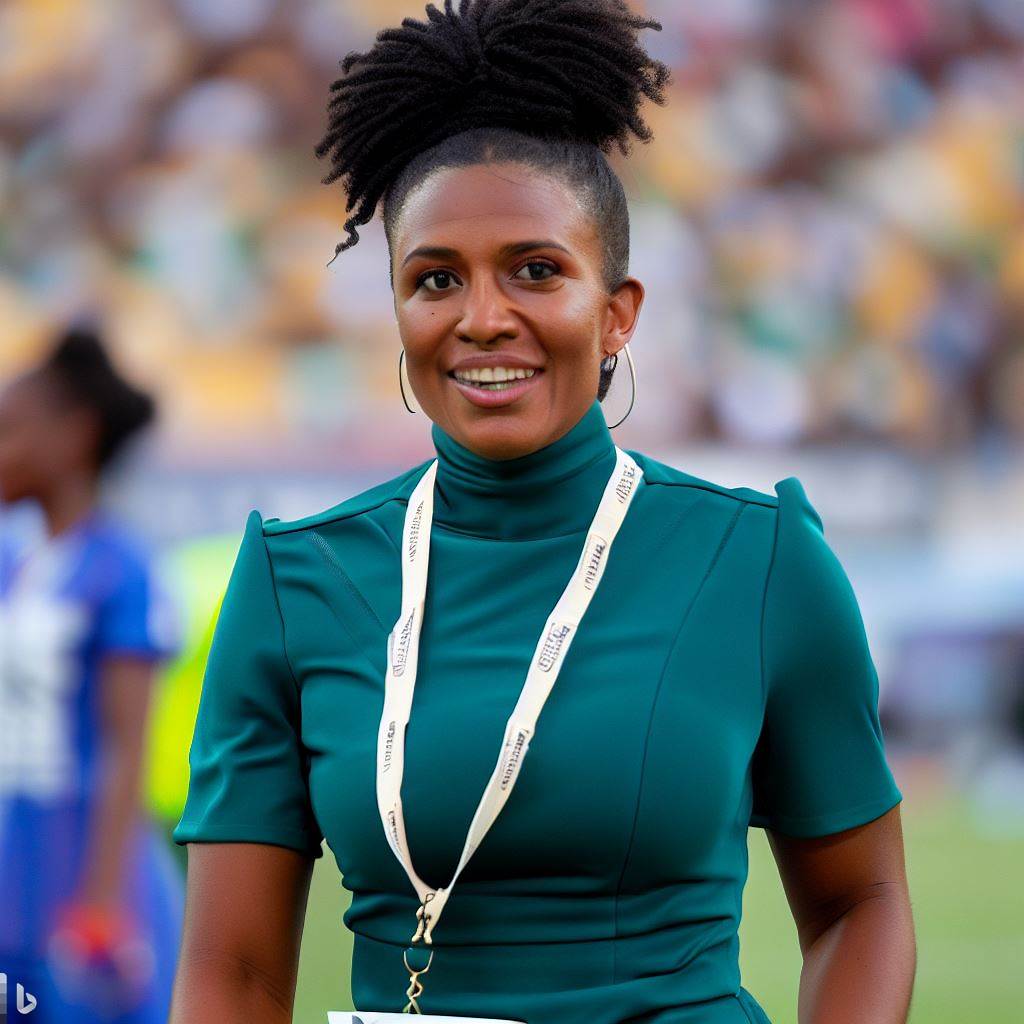Introduction
A. Definition of Sports Journalism
Sports journalism is the dynamic art of reporting sporting events, personalities, and stories. It informs, entertains, and educates audiences.
B. Importance of Ethics in Sports Journalism
- Upholds Integrity: Ethics ensure accurate reporting, preserving the integrity of both journalists and the sports world.
- Fairness: It guarantees fair treatment of athletes, teams, and stakeholders, fostering trust.
- Public Perception: Ethical reporting maintains a positive public perception of sports and journalism.
C. Purpose of the Blog Post
- Raise Awareness: Highlight the significance of ethical sports journalism in Nigeria.
- Provide Guidance: Offer practical insights to Nigerian sports journalists on ethical reporting.
- Promote Accountability: Encourage responsible journalism for a better sports community.
Understanding Ethics in Sports Journalism
A. Definition of ethics
Ethics in sports journalism refer to the moral principles and values that guide professionals in delivering accurate and fair news coverage.
B. Ethical standards in sports journalism
Sports journalists in Nigeria must maintain truth, accuracy, fairness, and impartiality while respecting privacy, confidentiality, and independence.
These ethics preserve professionalism and credibility in their reporting.
Ethics, moral principles guiding behavior, define sports journalism conduct. They ensure right and wrong reporting on sports events, athletes, and teams.
Key ethical standards for sports journalists include:
- Truth and accuracy: Verify and report factual information, separate truth from speculation through research and fact-checking.
- Fairness and impartiality: Provide balanced coverage, avoid biases or favoritism, present different perspectives.
- Privacy and confidentiality: Respect athletes’ privacy, avoid invasive reporting, handle confidential information responsibly.
- Independence and conflicts of interest: Maintain objectivity, avoid external influences, prevent conflicts like accepting gifts.
Understanding and upholding ethics in Nigerian sports journalism is vital.
Adhering to these standards ensures trustworthy, unbiased reporting, fostering professional growth and public respect.
Ethics must guide every sports journalist’s decisions to maintain integrity in the profession.
Read: A Day in the Life of an Assistant Coach in Nigeria
Ethical Challenges in Sports Journalism in Nigeria
In the field of sports journalism in Nigeria, professionals often encounter various ethical challenges that can compromise the integrity of their work.
These challenges include:
A. Sensationalism and Exaggeration
- Sport journalists sometimes sensationalize and exaggerate stories to attract more readers or viewers.
- They may manipulate headlines or twist facts to create a false sense of excitement or controversy.
- This unethical practice undermines the objective reporting of sports events and can lead to misinformation.
B. Corruption and Bribery
- The sports industry in Nigeria is not immune to corruption, and journalists may face pressure to engage in unethical practices.
- Journalists may be offered bribes or incentives to report favorably on certain teams, athletes, or events.
- This compromises their independence and objectivity, as their reporting becomes influenced by external interests.
C. Lack of Diversity and Representation
- There is a significant lack of diversity and representation in sports journalism in Nigeria.
- Women, ethnic minorities, and marginalized communities are often underrepresented or ignored in sports coverage.
- This lack of diversity leads to biased reporting and reinforces stereotypes, limiting the portrayal of a diverse range of sports stories.
D. Bias and Favoritism
- Sports journalists may display bias and favoritism towards certain individuals, teams, or organizations.
- They may promote personal agendas or be influenced by external factors such as relationships or financial interests.
- Objective reporting is essential, but bias and favoritism can distort the truth and compromise the integrity of sports journalism.
E. Invasion of Privacy
- Journalists sometimes invade the privacy of athletes and sports personalities in their pursuit of exclusive stories.
- They may publish personal information, engage in intrusive questioning, or stalk individuals to obtain private details.
- This invasion of privacy raises ethical concerns and can harm the well-being and reputation of those involved.
In a nutshell, sports journalism in Nigeria faces numerous ethical challenges that need to be addressed.
Sensationalism, corruption, lack of diversity, bias, and invasion of privacy are all issues that compromise the credibility and professionalism of sports reporting.
It is crucial for Nigerian sports journalists to adhere to ethical standards and strive for fair, objective, and inclusive coverage.
Read: Success Stories: Sports Nutritionists in Nigeria
Importance of Ethics in Nigerian Sports Journalism
A. Maintaining credibility and trust
In Nigerian sports journalism, maintaining credibility and trust is of utmost importance.
- Journalists must adhere to ethical standards to avoid compromising their integrity.
- By reporting accurately, journalists build credibility with their audience and the sports industry.
- Only through maintaining trust can sports journalists effectively inform and engage their readers.
B. Contributing to the development of sports in Nigeria
Furthermore, ethics in sports journalism contributes significantly to the development of sports in Nigeria.
- Ethical reporting improves the sports industry’s public image and attracts potential investors.
- By presenting unbiased opinions, sports journalists encourage fair competition and equal opportunities.
- Responsible reporting can also lead to increased participation in sports and fan engagement.
C. Protecting the rights and privacy of individuals
However, ethics is not only about the industry’s development; it also safeguards the rights and privacy of individuals.
- Sports journalists must respect the personal lives of athletes, coaches, and other sports personalities.
- Responsible reporting focuses on the facts of the game rather than indulging in sensationalism or gossip.
- Protecting privacy ensures that individuals can continue their careers without unnecessary interference.
D. Promoting professionalism and integrity in the field
Finally, ethics in sports journalism promotes professionalism and integrity in the field.
- Adhering to ethical guidelines ensures that sports journalists conduct themselves in a professional manner.
- Reporting with integrity means providing accurate information and avoiding conflicts of interest.
- Professionalism and integrity also extend to how journalists handle sensitive issues and controversial topics.
Overall, the importance of ethics in Nigerian sports journalism cannot be overstated.
- By maintaining credibility and trust, journalists can effectively inform and engage their audience.
- Ethical reporting contributes to the growth and development of the sports industry in Nigeria.
- Furthermore, it protects the rights and privacy of individuals involved in sports.
- Lastly, ethics promotes professionalism and integrity, ensuring responsible and accurate reporting.
As Nigerian sports journalists, it is our duty to uphold ethical standards and demonstrate our commitment to the field.
By doing so, we contribute to a healthier and more respected sports journalism industry in Nigeria.
Read: Roles & Responsibilities of a Fitness Nutritionist
Ethical Guidelines for Nigerian Sports Journalists
A. Fact-checking and verification
- Nigerian sports journalists should prioritize fact-checking and verifying information before publishing it.
- They must ensure that their sources are reliable and cross-check information from multiple sources.
- Journalists should refrain from reporting rumors or unverified claims that can damage an individual’s reputation.
- It is essential to uphold the highest standards of accuracy and truthfulness in sports journalism.
B. Avoiding conflicts of interest
- Nigerian sports journalists must maintain independence and avoid conflicts of interest that could compromise their reporting.
- They should disclose any potential conflicts or biases that may influence their coverage.
- Journalists should not accept gifts, favors, or any form of compensation that could affect their objectivity.
- Upholding the integrity of sports journalism requires avoiding personal or financial interests that may undermine credibility.
C. Promoting balanced and unbiased reporting
- Nigerian sports journalists should strive for balanced and unbiased reporting, presenting multiple perspectives on sports-related issues.
- They should present both positive and negative aspects of a story, avoiding sensationalism or partiality.
- Journalists must critically analyze information and present it in a fair and objective manner.
- By providing comprehensive and unbiased coverage, journalists uphold the credibility of sports journalism.
D. Respecting privacy and dignity of individuals
- Nigerian sports journalists should respect the privacy and dignity of individuals they cover.
- They must obtain consent before publishing personal or sensitive information about athletes, coaches, or other individuals involved in sports.
- Journalists should consider the potential impact of their reporting on the personal lives of individuals.
- Upholding ethical standards necessitates treating individuals with respect and avoiding unnecessary intrusion.
E. Ensuring fair and credible representation
- Nigerian sports journalists have a responsibility to ensure fair and credible representation of athletes from different backgrounds.
- They should avoid perpetuating stereotypes or biases based on gender, race, religion, or any other characteristic.
- Journalists must provide equal opportunities for athletes to share their stories and perspectives.
- By promoting inclusivity and fairness, sports journalists contribute to a more equitable and diverse sports industry.
In general, Nigerian sports journalists must adhere to ethical guidelines to maintain the integrity of their profession.
Fact-checking, avoiding conflicts of interest, promoting balanced reporting, respecting privacy, and ensuring fair representation are crucial principles.
By upholding these guidelines, sports journalists contribute to the development of a trustworthy and responsible sports journalism industry in Nigeria.
Read: Nigeria’s Top Schools for Sports Nutrition Training

Case Studies in Sports Journalism Ethics
A. Examples of ethical lapses in Nigerian sports journalism
- Biased Reporting: Journalists favoring certain teams or athletes and providing biased coverage.
- Sensationalism: Exaggerating or distorting news for more attention, disregarding accuracy.
- Conflicts of Interest: Journalists accepting gifts or bribes, compromising their objectivity.
- Plagiarism: Copying someone else’s work without giving proper credit or permission.
- Lack of Verification: Publishing unverified information without cross-checking the facts.
- Invasion of Privacy: Violating an individual’s privacy rights by disclosing personal information.
B. Lessons learned from past incidents
- Importance of Independence: Journalists must maintain independence and avoid conflicts of interest.
- Objectivity and Fairness: Reporting should be unbiased, providing equal coverage to all parties involved.
- Accountability: Journalists should be accountable for their actions and accept responsibility for any ethical lapses.
- Ethical Guidelines: News organizations should develop and enforce ethical guidelines to ensure responsible journalism.
- Training and Education: Ongoing training programs can help journalists understand and uphold ethical standards.
- Trust Building: Rebuilding trust with the public requires transparency and openness about ethical issues.
C. Implementing ethical practices in various situations
- Match Reporting: Journalists should strive for accurate, balanced, and unbiased reporting.
- Interviewing Athletes: Respect athletes’ privacy and obtain consent before publishing any personal information.
- Social Media Usage: Journalists must be mindful of the impact their social media posts can have on their credibility.
- Conflict of Interest: Journalists should disclose any potential conflicts of interest to maintain transparency.
- Unverified Information: Cross-check facts and sources before publishing any information to avoid spreading false news.
- Plagiarism Prevention: Properly attribute and credit sources, citing them correctly in the news articles.
Implementing ethical practices in Nigerian sports journalism is crucial for the credibility and integrity of the profession.
By learning from past incidents and addressing ethical lapses, journalists can regain the trust of the public and contribute to the growth and development of sports journalism in Nigeria.
Consequences of Unethical Sports Journalism
A. Decrease in public trust and credibility
- When sports journalists engage in unethical practices, such as biased reporting or spreading false information, it erodes the trust the public has in their work.
- People rely on sports journalism to provide them with accurate and reliable information about their favorite athletes and teams.
- Unethical practices can lead to a decrease in public trust, resulting in a loss of credibility for the journalists and the media outlets they work for.
B. Legal consequences and liabilities
- Unethical sports journalism can also have legal consequences for journalists and media organizations.
- Spreading false information can lead to defamation lawsuits, where individuals or organizations take legal action against journalists for damaging their reputation.
- Journalists can also face charges of libel or slander if they publish false statements that harm the reputation of athletes or sports organizations.
- These legal consequences can result in financial liabilities and tarnish the professional reputation of journalists.
C. Negative impact on athletes and their careers
- Unethical sports journalism can have a detrimental impact on athletes and their careers.
- When journalists engage in sensationalism or focus only on the negative aspects of an athlete’s life, it can harm their public image and reputation.
- This negative portrayal can affect endorsement deals, sponsorship opportunities, and even the athlete’s psychological well-being.
- Unethical reporting can also create unnecessary stress and pressure on athletes, which may impact their performance on the field.
D. Effect on the overall sports industry in Nigeria
- Unethical sports journalism not only affects individual athletes but also has a broader impact on the entire sports industry in Nigeria.
- When the media publishes biased or false information, it can create a negative perception of Nigerian sports and its professionals.
- This can deter potential investors, sponsors, and fans, resulting in a decline in funding and support for various sports initiatives.
- Unethical journalism can hinder the growth and development of the sports industry, making it difficult for athletes to thrive and achieve their full potential.
In essence, unethical sports journalism has significant consequences that go beyond the journalists themselves.
It erodes public trust, leads to legal consequences, negatively impacts athletes’ careers, and hinders the overall sports industry in Nigeria.
It is essential for sports journalists to uphold ethical standards and prioritize accuracy, fairness, and integrity in their reporting to maintain credibility and contribute positively to the development of sports in the country.
Call to Action for Nigerian Sports Journalists
A. Encouraging self-regulation and accountability
- Take responsibility for your actions and strive to adhere to ethical standards.
- Regularly reflect on your work and maintain a high level of self-awareness.
- Develop a strong ethical framework and consistently apply it in your reporting.
- Hold yourself accountable for the accuracy and fairness of your journalism.
- Strive to earn the trust of your audience by being transparent and honest.
B. Strengthening journalism education and training
- Advocate for the inclusion of ethics courses with a focus on sports journalism in journalism curricula.
- Encourage continuous professional development by attending relevant workshops and conferences.
- Seek out mentors who can provide guidance and support in ethical decision-making.
- Stay updated on industry best practices and technological advancements.
- Promote collaboration and knowledge-sharing among fellow sports journalists.
C. Establishing professional organizations and codes of conduct
- Join or create professional organizations that promote ethical journalism in sports.
- Advocate for the development of comprehensive codes of conduct specific to sports journalism.
- Participate actively in discussions and decision-making processes within these organizations.
- Encourage your colleagues to join these organizations and adhere to the established codes of conduct.
- Collaborate with other professional bodies to create a unified voice for ethical sports journalism.
D. Promoting ethical behavior through mentorship and collaboration
- Offer guidance and support to younger or less experienced sports journalists.
- Lead by example and demonstrate ethical behavior in your own work.
- Encourage open and honest discussions about ethical dilemmas within your newsroom.
- Collaborate with colleagues on investigative stories to ensure ethical reporting.
- Share resources and experiences to foster a culture of ethical journalism.
By implementing these strategies, Nigerian sports journalists can actively contribute to a more ethical and responsible sports journalism industry.
Through self-regulation, continuous learning, and collaboration, we can strive for higher standards of integrity and accountability in our work.
By uniting as a professional community, we can create a supportive environment that encourages ethical behavior and promotes the public’s trust in our reporting.
Conclusion
Recap of the importance of ethics in sports journalism
Ethics in sports journalism is of utmost importance for Nigerian professionals.
It ensures credibility, transparency, and fairness, enhancing the integrity of the industry.
By adhering to ethical guidelines, journalists can maintain the trust of athletes, fans, and society.
It is important to prioritize accurate reporting, avoiding sensationalism and biased narratives.
Journalists should also respect the privacy and dignity of athletes, seeking their consent before publishing personal information.
Final thoughts and recommendations for Nigerian professionals
Therefore, professionals must disclose any conflicts of interest and maintain independence in their reporting.
As technology advances, journalists should be cautious of fake news and verify information before publishing.
They should also be mindful of the impact their words can have on the mental health of athletes.
In order to improve ethics in sports journalism, Nigerian professionals should undergo regular training and education.
Media organizations should also establish and enforce strict ethical codes, with consequences for violations.
By upholding ethics in sports journalism, Nigerian professionals can play a vital role in promoting fair play and sportsmanship.
Ultimately, ethical sports journalism contributes to a healthy and positive sports culture in Nigeria.




